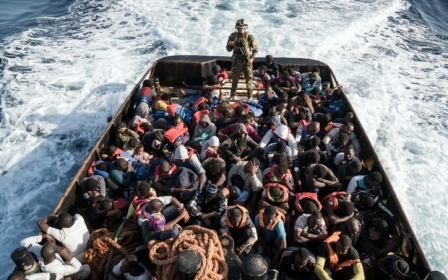Aquarius rescue ship will no longer operate along deadly Mediterranean routes

A search and rescue ship that has helped almost 30,000 refugees, migrants and asylum seekers in international waters between Libya, Italy and Malta has been forced to suspend operations, human rights groups announced.
Doctors Without Borders (MSF) and SOS-Mediterranee said on Thursday that the Aquarius would no longer operate in the Mediterranean Sea.
“This is a dark day,” Nelke Manders, MSF’s general director, said in a statement.
“Not only has Europe failed to provide search and rescue capacity, it has also actively sabotaged others’ attempts to save lives. The end of Aquarius means more deaths at sea, and more needless deaths that will go unwitnessed.”
The announcement comes amid ongoing reports of migrants and asylum seekers making the dangerous journey from the coast of Libya to Europe.
Earlier this week, the International Organisation for Migration (IOM) said at least a dozen people died when the rubber boat they spent more than 10 days in capsized near the coastal Libyan city of Misrata on Monday. Ten passengers were rescued, while three others remain missing.
“The survivors were all suffering from complete dehydration and exhaustion after being stranded at sea for days,” said IOM physician Mohamed Abugalia. “People suffered from trauma, severe malnutrition and burns sustained from the boat’s engine fuel.”
As of 2 December, more than 108,000 people have arrived in Europe by sea so far this year, according to IOM figures, while 2,160 people have been killed or gone missing in that same period.
The Libyan Coast Guard said it carried out 126 rescue operations in the Mediterranean between January and October, rescuing more than 14,000 migrants, the IOM reported.
The coast guard said almost 600 migrants were reported dead or missing between January and September.
Dangerous conditions
European countries have been accused of pushing asylum seekers back to Libya, where they are detained in horrific conditions and subjected to torture and even sold into slavery, according to various media reports.
Before the announcement on Thursday that it would stop operating, the Aquarius had been forced to remain in a European port the past two months, MSF said.
The humanitarian group decried what it said were attempts by European countries to stymie the vessel's efforts - as it was twice stripped of its registration and "faces allegations of criminal activity - allegations which are patently false".
The end of Aquarius means more deaths at sea, and more needless deaths that will go unwitnessed
- Nelke Manders, MSF’s general director
In particular, MSF said it has faced "a sustained campaign, spearheaded by the Italian government and backed by other European states, to delegitimise, slander and obstruct aid organisations providing assistance to vulnerable people".
Last month, dozens of migrants refused to disembark from a cargo ship that rescued them on their way to Europe and returned to Libya.
Docked at the port of Misrata, one of the migrants aboard said the asylum seekers feared returning to Libya, describing the country as “hell”. Eventually, after a 12-day stand-off, the Libyan coast guard forcibly removed the asylum seekers from the ship.
With the Aquarius no longer at sea, "today there are no dedicated rescue boats operating in the Central Mediterranean," MSF said on Thursday.
New MEE newsletter: Jerusalem Dispatch
Sign up to get the latest insights and analysis on Israel-Palestine, alongside Turkey Unpacked and other MEE newsletters
Middle East Eye delivers independent and unrivalled coverage and analysis of the Middle East, North Africa and beyond. To learn more about republishing this content and the associated fees, please fill out this form. More about MEE can be found here.




